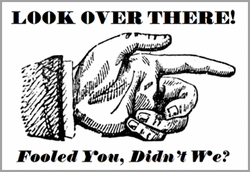
What is remarkable is this same type defense often arises when people talk about trademarks. The defense is usually brought up by a would-be infringer as a way to distract from the real issue (which is that they are infringing in the first place). The line usually goes something like this:
I see so many other people misusing a trademark in the media and they aren’t called-out by ABC company. If they are getting away with it, I should be able to get away with it, too.
Plain and simple: trademark misuse by someone else does not excuse your conduct (if you are misusing the trademark). When a trademark is being misused, the focus is on the misuse identified by the trademark owner, not other misuses. As far as the trademark owner is concerned, the use they are focused on is a use that is harming them (or could harm them). As long as the trademark owner can show the minimal elements necessary (ownership of a valid trademark and likelihood of confusion by the infringer’s use of the trademark), they are in business.
This is not to say that a trademark infringer couldn’t use unmitigated third party use to weaken the claims made by the trademark owner, namely that the trademark owner has a trademark interest in a word or symbol at issue. Here, the name of the game is to show that third party use of the trademark is rampant and the trademark owner has done next to nothing to enforce its trademark rights against each of these third parties. If trademark use is frequent and consumers are unable to identify a single source for the trademark (because so many others are using the trademark), then there can be no trademark and the infringer is not in the wrong. This is one case where the “look at them, not me” defense may work.
To keep it simple, there are really three basic defenses to trademark infringement:
1. Fair use of the trademark
2. Parody (using the trademark to poke fun at the trademark owner, where people can clearly tell that the trademark owner is being made fun of)
3. The trademark is invalid or is not in-fact a trademark


 RSS Feed
RSS Feed